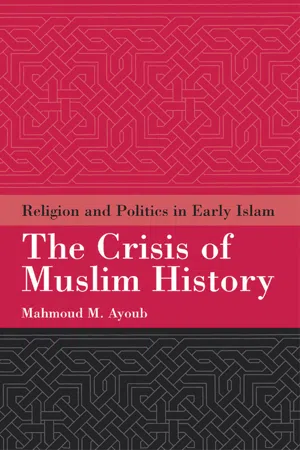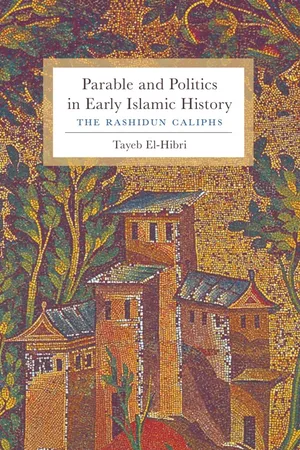History
Umar Ibn Khattab
Umar ibn Khattab was a prominent figure in early Islamic history, serving as the second caliph after the death of Prophet Muhammad. He is known for his just and effective leadership, expansion of the Islamic empire, and establishment of various administrative and judicial reforms. Umar's reign is often remembered for its emphasis on social justice, accountability, and good governance.
Written by Perlego with AI-assistance
Related key terms
2 Key excerpts on "Umar Ibn Khattab"
- eBook - ePub
The Crisis of Muslim History
Religion and Politics in Early Islam
- Mahmoud Ayoub(Author)
- 2014(Publication Date)
- Oneworld Publications(Publisher)
5‘Uthmān: Khalīfat Allāh
‘Uthmān’s caliphate constituted a total break with tradition and ushered in a new era of Muslim history. It was a break with the pious and somewhat austere framework within which the two venerable elders, Abū Bakr and ‘Umar, served the people in that it transformed the caliphate from an essentially tribal-religious authority into an autocratic institution. It ushered in a new era in that it brought to power a new dynasty that would change the structure of Muslim society and alter the course of its history.Abū Bakr, it should be remembered, saw himself as an inadequate but faithful representative (khalīfah ) of the Messenger of God. Although ‘Umar chose the epithet “ amīr al-mu’minīn ” (“Commander of the Faithful”), he nonetheless saw himself as “the successor of the successor of the Messenger of God.” ‘Uthmān, in contrast, preferred the title khalīfat Allāh (God’s representative), and thus did not feel bound by the precedent of the two elders.1 ‘Uthmān saw his rule as a God-given authority, resembling that of divine-right kingship rather than successorship (khilīfah ) to the Prophet of God.‘Uthmān’s Caliphate: Umayyad Power and the Beginning of Shī‘ī Opposition
The twelve-year rule of ‘Uthmān, the shaykh of the sons of Umayyah and twice son-in-law of the Prophet, was a period of intrigue and tragedy, of sedition and disenchantment. It led some among the Muslims to seek alternatives to the caliphal model and others to withdraw from social and political affairs altogether. Broadly speaking, the first group crystallized in Shi‘ism, the second in Sufism. ‘Uthmān’s rule set the stage for a degree of schism and civil strife that shook the Muslim ummah to its foundations.It was observed earlier that neither Abū Bakr nor ‘Umar saw their rank on the Prophet’s seat of authority (the minbar ) as equal with their rank and status. Thus Abū Bakr sat a step lower than the Prophet, and ‘Umar sat a step lower than Abū Bakr. ‘Uthmān, we are told, sat on the topmost step, where the prophet used to sit. When people questioned him about this highly symbolic act, he simply replied that Abū Bakr and ‘Umar had prepared the gesture for him. Some of the people present saw this as an ominous innovation, and one man observed, “Today evil was born.” Ya‘qūbī, who reported this event, added that as a result, some men were inclined towards ‘Alī and spoke critically of ‘Uthmān.2 Such men came to form an important element of the nucleus of ‘Alī’s followers (shī‘ah ) and to champion the cause of the Prophet’s family (ahl al-bayt - eBook - ePub
Parable and Politics in Early Islamic History
The Rashidun Caliphs
- Tayeb El-Hibri(Author)
- 2010(Publication Date)
- Columbia University Press(Publisher)
His charisma and strict moral example are shown to be sufficient deterrents in all political affairs. 79 This said, the image of ‘Umar’s forthrightness depends largely on how strictly one interprets his actions. A significant case in point is the episode of the Saq ī fa of Ban ū S ā ‘ida, which brought about the election of Ab ū Bakr for the caliphate. We have seen how ‘Umar played a critical role on that occasion in cajoling different groups to accept Ab ū Bakr as the first caliph, while ‘Al ī, who was said to be absent due to his preoccupation with preparing the Prophet’s body for burial, was effectively pushed aside. The victory of the Muh ā jir ū n over the An ṣ ā r (and ‘Al ī) in securing Ab ū Bakr’s caliphate can hardly be viewed as the result of mere force, but rather of shrewd diplomacy (or khid‘a). And although Ṭ abar ī throws a blackout on any negative assessment of that decision and, more importantly, denies ‘Al ī any direct criticism of these events, it seems clear that those who do express their anger (mainly Sa‘d b. ‘Ub ā da and al- Ḥ ub ā b b. al-Mundhir, leaders of the An ṣ ā r) speak as if on behalf of ‘Al ī and view the event as a deception engineered by ‘Umar. 80 While the events of the Saq ī fa are tightly controlled in description and the reaction of ‘Al ī is minimized, in later times ‘Al ī could not be kept silent any longer. The first of these occasions came at the sh ū r ā for the succession to ‘Umar’s position. When ‘Abd al-Ra ḥ m ā n b. ‘Awf screened the candidates suggested by ‘Umar in a way that ultimately favored ‘Uthm ā n over ‘Al ī, the latter, although conceding again to the other ṣ a ḥ ā ba, was quick to comment as he rose to give the bay‘a to ‘Uthm ā n, “Verily this has been a deception. What a deception! [ khid ‘ atun wa ayyu khid ‘ a !].” 81 To maintain a logical chain between the characters and statements, it should here be remembered that ‘Abd al-Ra ḥ m ā n b
Learn about this page
Index pages curate the most relevant extracts from our library of academic textbooks. They’ve been created using an in-house natural language model (NLM), each adding context and meaning to key research topics.

